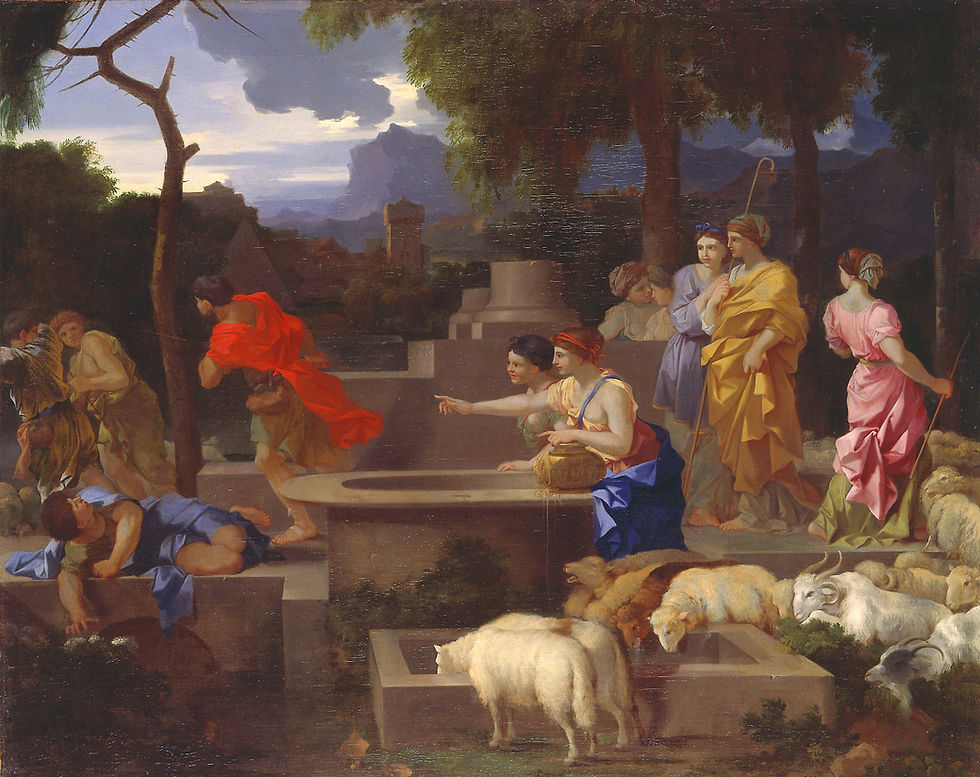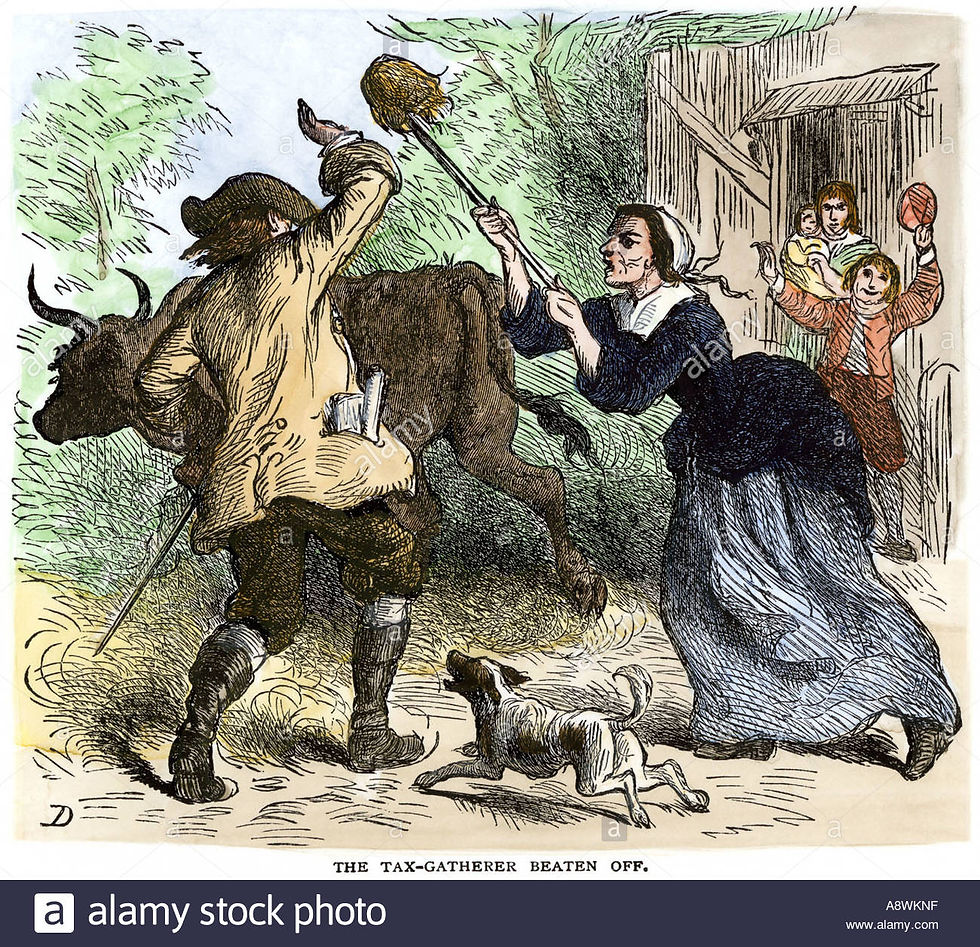Goodwill without Leviathan
- Rabbi Who Has No Knife

- Aug 23, 2021
- 6 min read

Much has been made of the coincidence of the publishing of the two greatest broadsides in the fight against the primacy of the State in human life – the American Declaration of Independence and Adam Smith’s masterpiece, the Wealth of Nation - in the same year, 1776.
One a voluminous tome, the other not much more than a single sheet of paper, they both denounce the State’s claim to the souls and bodies of Mankind. They uphold that Man was the State’s creator and master – not the other way around. They declare, most importantly, that once the creature forgot its proper place, its creator was at liberty to do away with it and replace it.
But herein lies the difficulty: the two authors, working almost simultaneously over with a vast ocean and a cruel war between them, could have not influenced each other. The Sage of Monticello couldn’t use Adam Smith’s cold analysis of political economy and Socrates of Edinburgh could have not benefitted from Jefferson’s impassionate plea for Liberty. Nor are they in complete agreement towards the application of the principles they share. For one, Jefferson was never an enthusiast of Free Trade, while Smith was less sanguine about the entire utility of colonizing America or other continents for the mother-country. Therefore, we must look for a common source for their common ideas.
The classical answer is usually to point to the proto-liberal writers of the 17th and 18th century, from Locke to Montesquieu who challenged the power of the monarchy by Divine Grace and upheld the importance of Private property, liberty and virtue. Further inquiry usually points out to older influence, to the writings of the ancients and of their renaissance admirers. Here was an example of Liberty, defiant in the face of ravenous tyranny! Here was virtue! Here was inviolability of persons and possessions!

The rub in it all was that while these sources urge the rulers to not oppress their subjects (and for the subjects, in turn, to not submit to tyrannical rulers and depose them by violence if necessary), the end goal was not an abolition of the State or even the creation of space vacant and free of it. The ideal was to create a GOOD State, which defined human life, happiness and virtue. Even as the State allowed and protected private property, the proper use of property was the State – either its service or the advancement of its holder within it, for the sake of honor and virtue – that is, the gaining of state recognition and cultivation of state-benefitting traits. The difference between the slavish subjects of tyrants and the fee citizens of a free state was that the former is forced to give his life and fortune for the good f his masters, the latter gives all to his country out of his own volition.
Concepts of virtue and honor outside the service of the State existed due to the prevalence of Biblical thought, who taught Mankind of another, more enduring State and of another, more illustrious king, whom all must serve equally.
However, between the adoption of Christianity by the Roman Empire and the rise of the Modern Era, the nominally religious monarchs of Europe subjected religious institutions to their will. Their wish was to break the periodical resistance such ideas inspired in their subjects and at the same time make those institutions devices to their repression. These Satanic schemes, rising again and again for over twelve bitter centuries, adapted the worst of both Classic and Medieval doctrines of rulership: the subject was to be placed within the ancient formula, that all aspects of his life are to be in service of the State, while the rulers’ conscious and duty would be placed under the eye of God alone (who conveniently had no Earthly courts and armies to punish offenders, or so it seemed).
The most successful and final revolt against such an attempt by the State were the English Civil Wars, in which Charles I, the head and indeed the embodiment of the English State, was executed for attempting to position himself as the beneficiary of all virtue, honor and fortune belonging to his people. On the continent, such rebellions (namely the Thirty Years War and the French Wars of Religion) were quashed. “He who holds the kingdom, holds the religion” became the formula. In Britain, dissenters, although limited and disfavored, were allowed to live and worship.
Nevertheless, since the ambition of the king was checked only by putting him under the power of the State, by making him a citizen like his subjects, by making him as Kipling had put it, “part of the People”, the State had gained primacy in human affairs, even in the British Isles. On the Continent, the kings, wary of future revolts, rather than submit themselves to the State as its “first citizens”, chose to take on the role of the State Incarnate, “l’Etat c’est moi!” declared Louis XIV of France. The result was that proto-liberals on the Continent hated kings and the church, while their counterparts on the Isles had been indifferent or at times even supportive of them. Proto-conservatives on the Continent were suspicious of anything outside the two, while in the Isles they were tolerant, or even encouraging of them.
But between the two, the State now truly reigned supreme in the minds of men. All honor, dignity and preferment had flown from the State and all enterprise, virtue and strength were to flow back to shore it up and glorify her. In the economic sphere, it meant not just that subjects were supposed to turn up taxes cheerfully and without complaints (as long as such taxes were levied in accordance to the proper procedure of the State, i.e., by an Act of Parliament), but also to navigate their trade according to State-Interest – that is, that the merchant is not materially different than the soldier. One fights for his nation’s defense and aggrandizement, the other for its enrichment. Profit was understood to be either a deserving reward the State is allowing a virtuous trader in her service to enjoy, or otherwise the mercenary wages of betrayal and greed.
What was the justification of it? Whether in France or in Britain, it was understood that the State was essential not only for the defense of the citizen’s life, but for the creation of human civilization, culture, farming, the useful and fine arts, as well of the development of all human excellence and virtue. In the “State of Nature” Man was understood to be a little better than the animals. Even such philosophers who had a less grim view of the “State of Nature” (such as Locke and Rousseau) or those who denied it (such as De Maistre) arrived at the same conclusion: civilization is as old as the State and the two depended on each other. The Great Leviathan (as Hobbes had dubbed it) of the State was necessary for the existence of human society, for peace on Earth and good will among men.
Scotland and Virginia of the 1700s were incredibly different places, but they had at least one problem in common: people immigrating to settle in the western frontiers of America, beyond the boundaries chartered and mapped official colonies. That these migrants were in many cases Scot-Irish people, with a habit of occasional obedience to the State and permanent suspicion of it, did not alleviate the concern of statemen and pundits alike. No lesser humanist than Dr. Samuel Johnson, the most celebrated literal persona in the kingdom raised the concern that not only are the Highlands and isles of Scotland losing their inhabitants and usefulness, but also that the migrant settlers shall lose their culture and civilization in the wilderness of North America, turning to savages. Some of the Virginian political class shared such concerns. At any rate they were much alleviated by the profitability of western land speculations, so no legislative attempts to control the flow of migration westward was successful.
The settlers however, did not “revert to savagery”. Their culture, rather than diminishing, it evolved. New networks of neighborliness, good-will and mutual help developed in the effectively stateless territories and eventually, higher learning and religion. Patrick Henry, although not a good practicing lawyer, was not atypical in his self-taught erudition. The mold of the backwoods scholar who repleted his classical education with homespun wisdom, or that of the frontier religious firebrand developed quickly and are one of the most enduring features of American life. In short, in the long term, neither the settlers’ humanity, nor their lawfulness, honor or artistic sensibility or competence were diminished by the absence of the State. On the contrary, when the time allowed and necessitated it, they were perfectly capable to form their own, very minimal, state structure for mutual defense.
Considering how many of these settlers were Scots who travelled through Edinburgh, Smith was in the perfect position to learn of this phenomenon, which denied the Statist theories of his time. So did Jefferson, the aristocrat of Virginia, the State that nominally owned almost the entire western frontier and therefore kept records of migration there.
Thus, the true inspiration to the works of both Smith and Jefferson was not to be found in books and treatises, describing human society as it may be or should have been, but in an unintended experiment on the grandest scale, that had demonstrated without error that the society which is less governed -prospers.
Leviathan was not, it appears, the bringer of Peace on Earth and Good-will among men. Something else. Something innate and human and sublime was at work here, fashioning a free, charitable, lving nation out of disparate migrants. Whatever or whoever that was, it demanded no tax money for the English crown, nor a conscription to the king’s army.
It certainly had no interest in regulating trade.





Comments